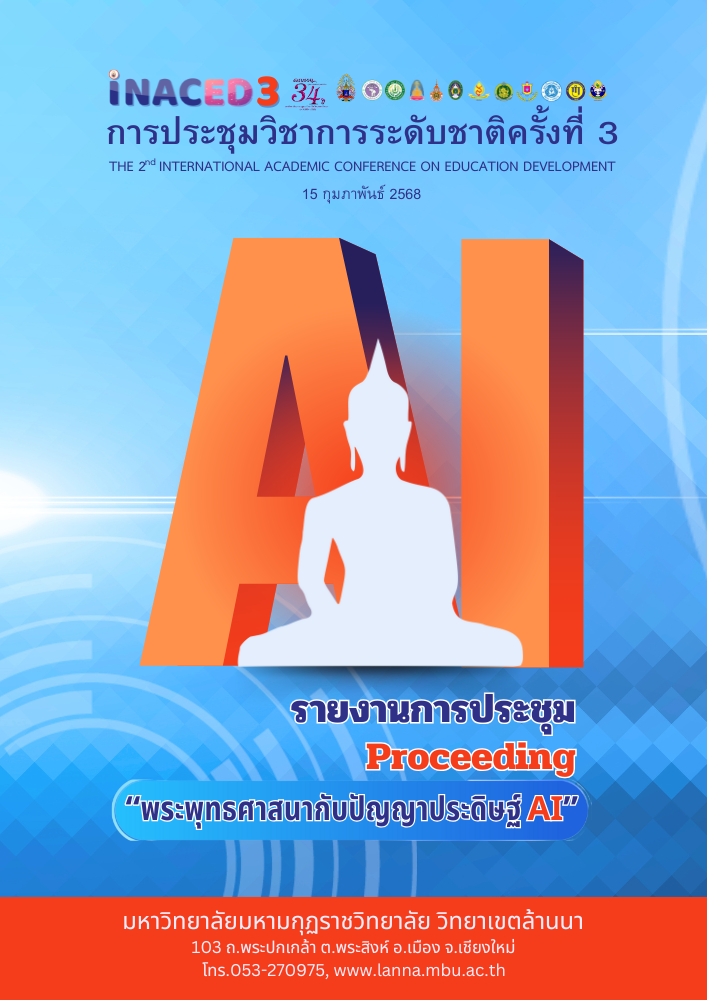THE DEVELOPMENT OF ENGLISH VOCABULARY PRONUNCIATION SKILLS THROUGH BRAIN-BASED LEARNING FOR GRADE 3 STUDENTS AT BAN BUAK PAO SCHOOL
บทคัดย่อ
This research aims to: 1) test the effectiveness of the English vocabulary pronunciation skill practice for grade 3 students at Ban Buak Pao School according to the 70/70 standard criteria; 2) compare the achievement in English vocabulary pronunciation before and after learning using brain-based learning management for grade 3 students at Ban Buak Pao School; and 3) examine the satisfaction of grade 3 students towards the brain-based learning management approach. The experimental group consisted of grade 3 students at Ban Buak Pao School, selected through simple random sampling. The research design was quasi-experimental, using a single-group pre-test and post-test approach. The research instruments included lesson plans, pre- and post-tests, and a student satisfaction survey. Data were analyzed using basic statistical methods, including mean, standard deviation, percentage, and t-test.
The results of the research revealed that: 1) The effectiveness of the English vocabulary pronunciation skill practice for grade 3 students at Ban Buak Pao School was 74.78/73.77, which is higher than the standard criteria of 70/70; 2) The achievement in English vocabulary pronunciation after learning through brain-based learning management was significantly higher than before learning at the .05 level; and 3) The satisfaction of grade 3 students towards the brain-based learning management approach was at the highest level.
Keywords: Pronunciation skills, Vocabulary, Brain-based learning management
บรรณานุกรม
Ailada Chanloy. (2019). English Pronunciation with Using Peer-Assisted Learning for Prathomsuksa 4 Students. Master’s Thesis in Education: Dhurakij Pundit University.
Khaneangchai Viriyasoonthon. (2019). Learning Management to Promote Reading Writing and Critical Thinking Skills of Grade 2 Student. Journal of Srinakharinwirot University. 15(1): 130-142. Sisaket: Srinakharinwirot University.
Kulthida Uansri. (2019). Development of English Reading Skills through Reading English Short Stories for Grade 6 Students. Khon Kaen: Chumphae Pittayakhom School. (Research Report in Thai).
Lalida Thongrat. (2020). The Development of English Reading Aloud skill through the Use of Phonics based on the Davies Instructional Model of Grade 11 Students. Master’s Thesis: Mahasarakham Rajabhat University
Ministry of Education. (2008). The Basic Education Core Curriculum B.E. 2551. Bangkok: Teacher Council Printing House, Lat Phrao.
Nattaphong Tangphet. (2013). Development of Grade 5 Students' Concept of Perception and Response of Living Organisms through Brain-Based Learning: Action Research. Kasetsart University. (Research). Master of Education (Science Education) Graduate School: Kasetsart University. (in Thai)
Nattanan Jantasok and Warangkana Tesana. (2021). Improving Reading and Spelling Skills of Prathomsuksa 6 Students by Using Exercises with Brain-Based Learning (BBL). Chonburi : Manpower Potential Development Institute Journal for Eastern Economic Corridor. Vol.1 No.2 May – August 2021.
Patcharin Jantee. (2022). Development of English listening comprehension achievement using podcast for grade-10 students at Chiang dao Wittayakom school, Chiang Mai. (Research). Master of Education in English Program. Phitsanulok: Naresuan University.
Ratchadakan Yaidee. (2022). The reading aloud skill development by using phonics exercises of grade 4 students at Bannontarod school, Kamphaengphet province. Graduate College: Naresuan University.
The National Education Act. (1999). National Education Act B.E. 2542. [Retrieved on June 30, 2021]. Available at https://shorturl.asia/3sE5P
The National Institute of Educational Testing Service (2022). Summary of the National Educational Test (O-NET) results for Grade 6 in the academic year 2022. Retrieved from https://www.niets.or.th/th/content/view/25618 on 7 May 2024.
Witthayakorn Chiangkul. (2005). Learn Deep, Know Fast: Use the Brain Effectively. Bangkok: Institute for Promoting Intelligence and Learning Innovation.

